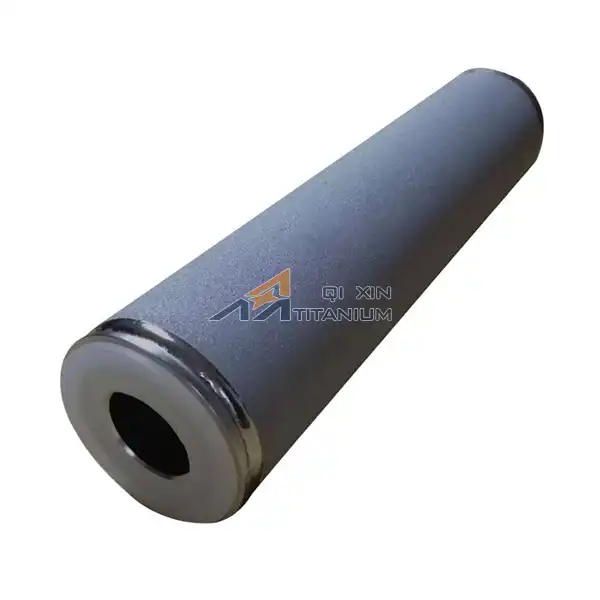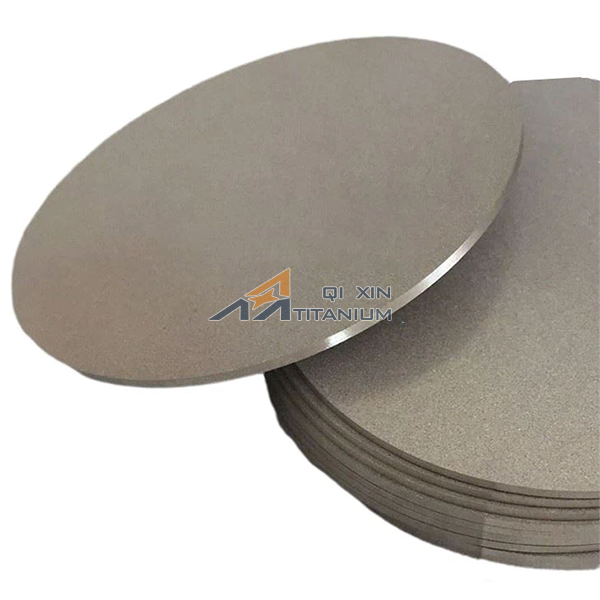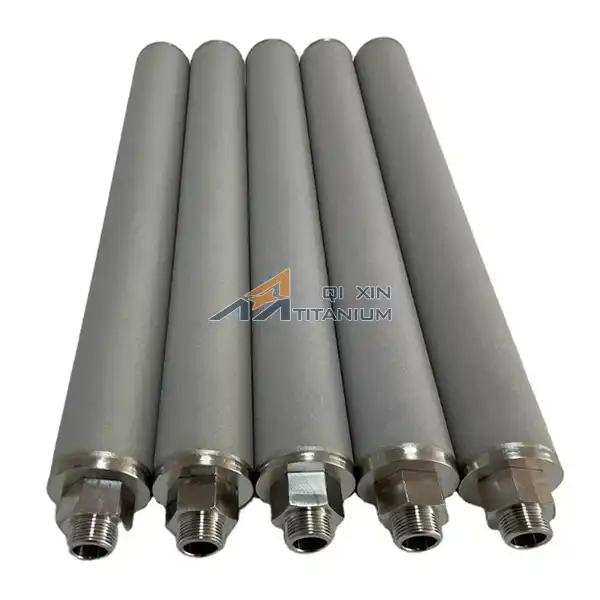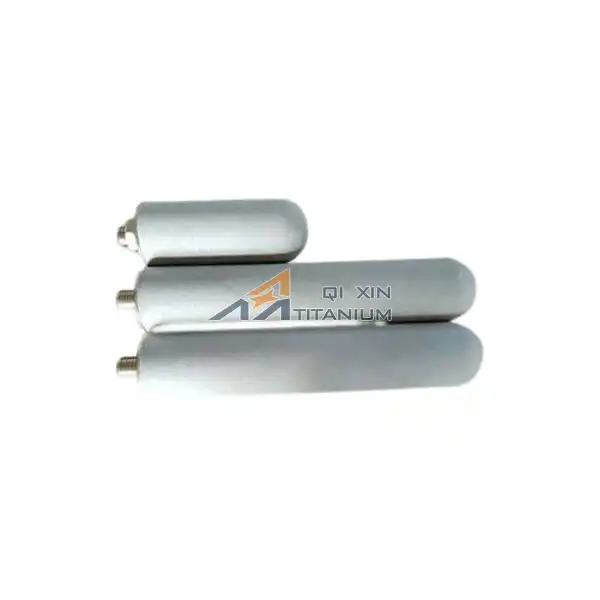Are there different types of coatings available for electrolyzed titanium sheet electrodes?
2025-03-26 08:54:42
Various Coatings Are Available For electrolyzed titanium sheet electrodes, each designed to enhance performance in specific applications. Common coatings include ruthenium oxide, iridium oxide, and platinum, which improve conductivity, durability, and resistance to corrosion. These coatings cater to industries like water treatment, chlor-alkali production, and electroplating, ensuring optimal efficiency and longevity. Selecting the right coating depends on factors like the operating environment, current density, and desired lifespan. At Qixin Titanium Co., Ltd., we specialize in customizing coated titanium anodes to meet diverse global needs, leveraging our 18 years of manufacturing expertise.
Understanding Coatings for Electrolyzed Titanium Sheet Electrodes
Coatings play a pivotal role in the performance of electrolyzed titanium sheet electrodes, transforming them into robust, efficient tools for various industrial processes. These coatings are not merely protective layers; they enhance conductivity, resist harsh chemical environments, and extend the electrode's lifespan. Let's explore the essentials of these coatings and why they matter.
Why Coatings Matter for Titanium Electrodes?
Titanium, while naturally corrosion-resistant, requires coatings to optimize its functionality in electrolytic processes. Uncoated titanium forms a non-conductive oxide layer when exposed to certain conditions, reducing efficiency. Coatings like ruthenium oxide or iridium oxide create a conductive surface, enabling the electrode to perform effectively in applications such as water electrolysis or chlorine production. This enhancement ensures consistent performance, minimizing energy loss and operational costs.
Common Applications of Coated Titanium Electrodes
Industries worldwide rely on coated titanium electrodes for their versatility. In water treatment, these electrodes facilitate the generation of disinfectants like hypochlorite. The chlor-alkali industry uses them to produce chlorine and caustic soda, while electroplating benefits from their ability to deposit metals uniformly. Each application demands specific coating properties, such as high oxygen evolution potential or resistance to acidic environments, making customization essential.
Factors Influencing Coating Selection
Choosing the right coating for an electrolyzed titanium sheet electrode involves evaluating several factors. The operating environment - whether acidic, alkaline, or neutral - determines the coating's chemical stability. Current density, or the amount of electric current per unit area, affects the coating's durability. Additionally, the desired lifespan and maintenance frequency influence the choice. For example, iridium-based coatings excel in high-current, oxygen-evolving environments, while platinum coatings suit low-current, specialized applications.
Types of Coatings for Electrolyzed Titanium Sheet Electrodes
The diversity of coatings available for electrolyzed titanium sheet electrodes allows industries to tailor solutions to their unique needs. Each coating offers distinct properties, making it suitable for specific conditions. Let's examine the most common types and their benefits.
Ruthenium Oxide Coatings
Ruthenium oxide coatings are widely used due to their excellent conductivity and stability in chlorine-evolving environments. These coatings exhibit a low chlorine evolution potential, making them ideal for the chlor-alkali industry. Their robust nature ensures longevity, even under high current densities. However, they are less effective in oxygen-evolving conditions, where alternative coatings may perform better. Industries seeking cost-effective, durable solutions often opt for ruthenium oxide-coated titanium electrodes.
Iridium Oxide Coatings
Iridium oxide coatings shine in oxygen-evolving applications, such as water electrolysis and wastewater treatment. When applied to an electrolyzed titanium sheet electrode, they offer exceptional resistance to corrosion and high oxygen evolution potential, ensuring efficiency in demanding environments. These coatings are particularly valuable in processes requiring long-term stability, as they withstand aggressive chemical conditions. While more expensive than ruthenium oxide, iridium oxide coatings provide superior performance in specific scenarios, justifying the investment for industries prioritizing durability.
Platinum Coatings
Platinum coatings, though less common, are prized for their versatility and conductivity. They excel in low-current applications, such as electroplating and certain electrochemical sensors. Platinum's inert nature ensures minimal degradation, even in corrosive environments. However, its high cost limits widespread use, making it suitable for specialized, high-value applications. For industries requiring precision and reliability, platinum-coated titanium electrodes offer unmatched performance, albeit at a premium.
Choosing the Right Coating for Your Needs
Selecting the appropriate coating for an electrolyzed titanium sheet electrode requires careful consideration of your application's demands. The right choice enhances efficiency, reduces maintenance, and extends the electrode's lifespan. Let's explore how to make an informed decision.
Assessing Your Application's Requirements
Begin by evaluating the specific needs of your process. Consider the electrolyte composition - whether acidic, alkaline, or neutral - as it impacts coating stability. Determine the current density, as high currents may necessitate more durable coatings like iridium oxide. Additionally, assess the desired lifespan and maintenance intervals. For example, water treatment facilities prioritizing longevity may prefer iridium-based coatings on an electrolyzed titanium sheet electrode, while chlor-alkali plants may opt for ruthenium oxide for cost-efficiency.
Balancing Cost and Performance
Coating selection often involves balancing cost with performance. Ruthenium oxide coatings offer a cost-effective solution for chlorine-evolving processes, while iridium oxide coatings, though pricier, excel in oxygen-evolving environments. Platinum coatings, while expensive, provide unparalleled precision in specialized applications. Understanding your budget constraints and performance expectations helps narrow down options. At Qixin Titanium Co., Ltd., we work closely with clients to recommend coatings that align with their goals, ensuring value without compromising quality.
Partnering with Experts for Customization
Navigating the complexities of coating selection can be challenging, but expert guidance simplifies the process. Collaborating with experienced manufacturers ensures access to tailored solutions. Our team at Qixin Titanium Co., Ltd. leverages 18 years of expertise to customize coated titanium anodes for global clients. We analyze your application's requirements, recommend suitable coatings, and provide ongoing support. This partnership approach guarantees electrodes that meet your needs, enhancing efficiency and fostering long-term success.
Conclusion
Coatings for electrolyzed titanium sheet electrodes, such as ruthenium oxide, iridium oxide, and platinum, cater to diverse industrial needs, enhancing conductivity and durability. Selecting the right coating depends on factors like operating environment, current density, and lifespan requirements. At Qixin Titanium Co., Ltd., we specialize in customizing solutions to optimize performance for global clients. Understanding these coatings empowers industries to make informed decisions, ensuring efficiency and longevity.
Contact Us
For more information about our range of coated titanium anodes and electrolyzed titanium sheet electrodes, please don't hesitate to contact us at info@mmo-anode.com. Our team of experts is ready to help you find the perfect electrode solution for your specific needs.
References
Trasatti, S. (2000). Electrocatalysis: Understanding the success of DSA electrodes. Electrochimica Acta, 45(15-16), 2377-2385.
Chen, G., & Bare, S. R. (2011). Design of advanced coatings for titanium anodes in electrochemical applications. Journal of Materials Chemistry, 21(12), 4132-4141.
Beer, H. B. (1980). The invention and industrial development of dimensionally stable anodes. Journal of the Electrochemical Society, 127(3), 303C-307C.
Comninellis, C., & Nerini, A. (1995). Anodic oxidation of organic compounds on Ti/IrO2 electrodes. Journal of Applied Electrochemistry, 25(1), 23-28.
Kotz, R., & Stucki, S. (1987). Stabilization of RuO2 by IrO2 for anodic oxygen evolution in acid media. Electrochimica Acta, 32(9), 1311-1316.
Panizza, M., & Cerisola, G. (2009). Electrocatalytic materials for the electrochemical oxidation of organic pollutants. Chemical Reviews, 109(12), 6541-6569.
Send Inquiry
Related Industry Knowledge
- How does a round air stone diffuser work?
- What is the filtration rating of metal sintered filters?
- Versatile Applications of Electrolyzed Water Titanium Mesh Electrodes
- Platinum Plated Titanium Mesh Electrodes in Industrial Water Treatment Systems
- Electrolyzed Titanium Sheet Electrode for Efficient Water Treatment
- Maximize Filtration Precision with Sintered Metal Filter Plates
- What Materials are Used in Titanium MMO Anodes?
- How do I select the right DSA coating titanium anode for my specific process?
- What Applications Use ICCP Titanium Rod Anodes?
- How does the MMO titanium Anode work?





